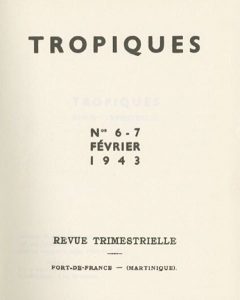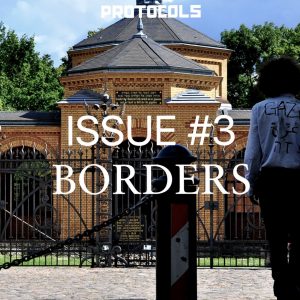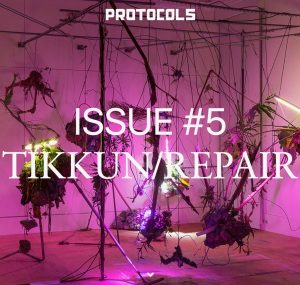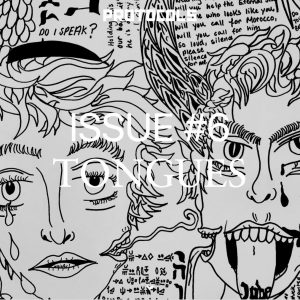We sat down this week with Benjamin Ratskoff, a PhD candidate in the UCLA Dept. of Comparative Literature and 2017-2018 recipient of the UCLA Fritz, Jenny and Gustav Berger Fellowship in Holocaust Studies, to discuss his work as Editor-in-Chief of PROTOCOLS, a biannual Jewish cultural journal situated at the intersections of politics and art. We discussed the origins of the publication, its connections to his academic work, and their most recent issue #6: TONGUES, available now at www.prtcls.com.
Tell us a bit about the thinking behind PROTOCOLS and how the journal came to be.

PROTOCOLS came together about four years ago as a response to multiple, intersecting observations. First, there was a real vacuum in Jewish media for progressive and left perspectives at a political moment when people, and especially young people, were really starved for them. Second, a perceived uptick in antisemitic language, symbols, and violence created a kind of Jewish identity revival among a number of progressive young people and we wanted to provide a resource where these people could (re-)approach Jewish culture and thought in sophisticated and multiple ways. Third, there was little conversationin general about Jewish aesthetics and even less about the relationship of Jewish aesthetics to Jewish politics. Too often, Jewish aesthetics have been confined and neutralized as “Judaica”; we wanted to present a more expansive idea of Jewish culture as a broad field of artistic engagement and play and one with an inherently political dimension. I myself study Black cultural production in the interwar years and drew inspiration from the journals of that period that juxtaposed political analysis with literature and art (e.g. Légitime Défense, Tropiques).
The reason for this lack of a conversation around Jewish aesthetics relates to another of our animating observations: that hegemonic institutions —from states to non-profits—were censoring and silencing Jewish writers and artists who transgressed the party line on Israel/Palestine, which had then led to broad self-censorship and a weakening of writerly and artistic practice in general. We felt that we needed alternative spaces, spaces outside of the philanthropy-dominated ones in the United States or the government-controlled ones elsewhere, spaces where artists could show provocative work and people could engage with it. Finally, we felt alienated by the assertive “secularism” foundational to a lot of Jewish discourses and platforms that did exist on the left. We who created PROTOCOLS have close and intimate relationships with so-called Jewish “religion” and view the assumption of a secular-left/religious-right divide as extremely problematic, not least for its Orientalist and colonialist posture and for the ways it has impeded leftist organizing in Israel/Palestine. So a key motive behind creating PROTOCOLS was to make a home for ourselves, and in the process, disrupt those political grids.
Can you say a bit more about that – why do you think so many writers and artists feel left out, dismissed, or otherwise marginalized from Jewish publishing and the Jewish public sphere, as it exists today?
 A lot of the exclusion has to do with what I call—riffing on Sarah Shulman—the gentrification of the Jewish mind. There’s been a kind of shrinking of permissible thought and creativity in the Jewish public sphere as Jews have increasingly aligned themselves with the bourgeois center, increasingly relied on wealthy donors to fund their organizations, and increasingly centered Zionism as the foundation of Jewish identity. In a broad sense, Jewish identification with postwar liberalism has made mainstream publications hostile to perspectives that challenge the political and economic status quo. There are lots of examples in just the past couple of years of mainstream platforms and spaces enforcing strong red lines when artists and writers veer left of the “two-state solution” ideology: I’m thinking of the American Jewish Historical Society’s abrupt cancellation of a reading of Dan Fishback’s play “Rubble, Rubble” in 2017; or their cancellation of Amir Guberstein’s exhibition the same year. I’m thinking of the eviction of the Barbur Gallery by the Jerusalem municipality this year; or the police interrogation in 2016 of an art student at Bezalel Academy. I’m thinking of the German Bundestag’s resolution in May 2019, which defined the non-violent BDS movement for Palestinian human rights as antisemitic—even though many of its supporters in Germany are Israeli Jewish ex-pats. All of these events and more have had a cumulative chilling effect and artists retreat from producing work that challenges the political status quo; professors and students from Bezalel reflecting on the effects of the police interrogation have told me this explicitly. So, in order to combat that chilling effect, we need to create more platforms and spaces! We can’t just beg to be included in the existing ones.
A lot of the exclusion has to do with what I call—riffing on Sarah Shulman—the gentrification of the Jewish mind. There’s been a kind of shrinking of permissible thought and creativity in the Jewish public sphere as Jews have increasingly aligned themselves with the bourgeois center, increasingly relied on wealthy donors to fund their organizations, and increasingly centered Zionism as the foundation of Jewish identity. In a broad sense, Jewish identification with postwar liberalism has made mainstream publications hostile to perspectives that challenge the political and economic status quo. There are lots of examples in just the past couple of years of mainstream platforms and spaces enforcing strong red lines when artists and writers veer left of the “two-state solution” ideology: I’m thinking of the American Jewish Historical Society’s abrupt cancellation of a reading of Dan Fishback’s play “Rubble, Rubble” in 2017; or their cancellation of Amir Guberstein’s exhibition the same year. I’m thinking of the eviction of the Barbur Gallery by the Jerusalem municipality this year; or the police interrogation in 2016 of an art student at Bezalel Academy. I’m thinking of the German Bundestag’s resolution in May 2019, which defined the non-violent BDS movement for Palestinian human rights as antisemitic—even though many of its supporters in Germany are Israeli Jewish ex-pats. All of these events and more have had a cumulative chilling effect and artists retreat from producing work that challenges the political status quo; professors and students from Bezalel reflecting on the effects of the police interrogation have told me this explicitly. So, in order to combat that chilling effect, we need to create more platforms and spaces! We can’t just beg to be included in the existing ones.
You’ve chosen a very provocative title – PROTOCOLS – why did you choose that name and what does it reveal about the journal’s aims?
There are basically two ways we think about the title. First, we want to re-inject some irreverence and play into Jewish media, in place of the self-seriousness and inflated moral outrage that often define Jewish political conversations—especially ones on antisemitism. Our name is intentionally meant as a sort of cheeky provocation, to kind of confuse the outrage and open up a space for richer, more difficult lines of critical inquiry. Second, we wanted to suggest a strategic repositioning in terms of fighting antisemitism. It is useless, as Hannah Arendt wrote, to simply assert that the “Protocols” is a forgery or a lie when the fact of the matter is that the lie is believed. If we begin from this fact of the matter, in order to fight anti-Semitism, we must be more creative than simply pointing out the “lie” and depicting its followers as childish dupes or congenital Jew-haters. We look to other models, such as the anti-racist Black Francophone activists and writers of what became the “Négritude” movement, who refused to deny the racist lie. Instead of trying futilely to “undo” their racialization, they took hold of the racist pejorative “nègre” and, as scholar Brent Hayes Edwards describes, realigned it. Likewise, for us, we want to grab hold of this antisemitic sign—the “Protocols”—and realign it, because it’s futile to try and “undo” the last century of the text’s dispersion. Instead, we want to pull the rug out from under the ideological system that produced it and that it reproduces. They say there is a group of Jews plotting world domination. Well, come and take a look…
While many long-time independent and alternative publications have collapsed under the weight of corporate ownership and dwindling sales, Jewish publishing seems to have grown in the same period, with new digital publications and the refashioning of older ones. How would you distinguish PROTOCOLS from these other Jewish publications?
One way we distinguish ourselves is form. We are really the only Jewish cultural journal situated at the intersections of politics and art, considering that intersection especially rich and mobilizing. All of our issues include political essays alongside original fiction and poetry, video art, photography, and more! We also have an extremely internationalist focus: diaspora for us is first and foremost a practice rather than an ideology or identity. Each theme-based issue creates a delimited cultural conversation that puts multiple writers and artists from around the world and from different social locations in complex relation. In our most recent issue, for example, you can go from Paris-based writer Jo Mrelli’s imagined dialogue between her contemporary and older selves—and the inevitable confusions, impasses, and mistranslations it entails—to Baltimore-based artist’s Liora Ostroff’s aesthetic representation of a midrashic narrative on angels and national languages to a totally indescribable Talmudic “catchat” assembled by an art historian, an artist, and a theoretician based in Vienna, New York, and Berlin, respectively.
The other way that we are different is material: we are a volunteer-run organization and we have no institutional, foundation, or non-profit backing. This is a huge challenge because we are constantly chasing money just to have the bare minimum to compensate contributors. But it’s also what permits us to maintain such a heterodox publication, a publication that includes everything from rabbinic “Tikkun Olam” source sheets to political essays from members of the Palestinian Youth Movement. While there has been a lot of progressive criticism of the mega-rich donors who control Jewish non-profit institutions, this criticism doesn’t seem to be matched by a progressive effort to transform Jewish funding at the grass-roots level; progressive oligarchs are still, after all, oligarchs. We are trying to advance a revolutionary shift in the way people financially relate to Jewish media and culture, by relying on individual contributions, on everyday people financially supporting the work they want to see in the world.
To offer your support to PROTOCOLS, click here: https://fundraising.fracturedatlas.org/protocols
Each issue of PROTOCOLS is organized around identifiable Jewish themes – such as “Chosen,” “Violence,” and “Tikkun/Repair” – that you then expound upon in playful, cheeky, and sometimes outrageous ways. Tell us about your latest issue, “TONGUES,” and the abstract and literal ways your contributors have approached the theme.
A great question. All of our themes really do try to begin somewhere in Jewish culture or history and then mobilize the different, contradictory discursive strands entangled within it. Thinking about the relation between the abstract and literal, the conceptual and the tactile, has been central to the publication for some time. In our current issue, “TONGUES,” we are thinking about tongues as literal organs—organs for speech, for pleasure, for disease, for taste—and also as metaphors for language, which give life to cultures, root identities, and create borders. LA-based writer Jason Lipeles has a moving essay, “Your Love is Like a River,” that weaves a reflection on Jewish theological texts with a personal narrative of sexual encounter and its aftermath. UCLA PhD candidate Molly Oringer is in conversation with artist Michael Rakowitz about how he represents taste, exile, and displacement in his practice. Tamir Amar Pettet, a young London-based artist, plays with antisemitic stereotypes of Jewish parasites and vampires in his chaotically beautiful work “JEW BOY.” Muhammad Jabali’s illustrations humorously represent how Hebrew and Arabic interact in the rapidly gentrifying, hipsterized Jaffa. So that’s just a taste, if you will, of what some of the current issue offers and all the different directions TONGUES takes it.
If you are interested in contributing to our next issue, #7: SIX + GENDERS, email me at ben@prtcls.com or send your text submissions to submissions@prtcls.com and art submissions to art@prtcls.com.
Alongside your editing and developing of PROTOCOLS, you’re also working on a PhD. How does your work on PROTOCOLS connect to your academic research and writing?
They are definitely related! I don’t think I could do one without the other, both practically and intellectually. When I have one, singular task to focus on, I never get it done. It’s like what the Lubavitcher Rebbe (ztz”l) used to tell people when they told him they were overworked: add more. Sometimes you need more pressure, not less, to make everything fall into place. But in an intellectual sense, the projects are very, very related. As an undergraduate in Black Studies, I was exposed to a whole world of publishing—newspapers, magazines, journals—that linked the Black diaspora into an international political organism, a world of Black cultural and political work that my dissertation focuses on today. The very idea of the journal is in conversation with the source material I use in my research. In another sense, as my dissertation research is focused on rethinking fascism, Nazism, and antisemitism from the perspective of Black thought and politics, the political impulses behind both projects certainly converge and interact.

